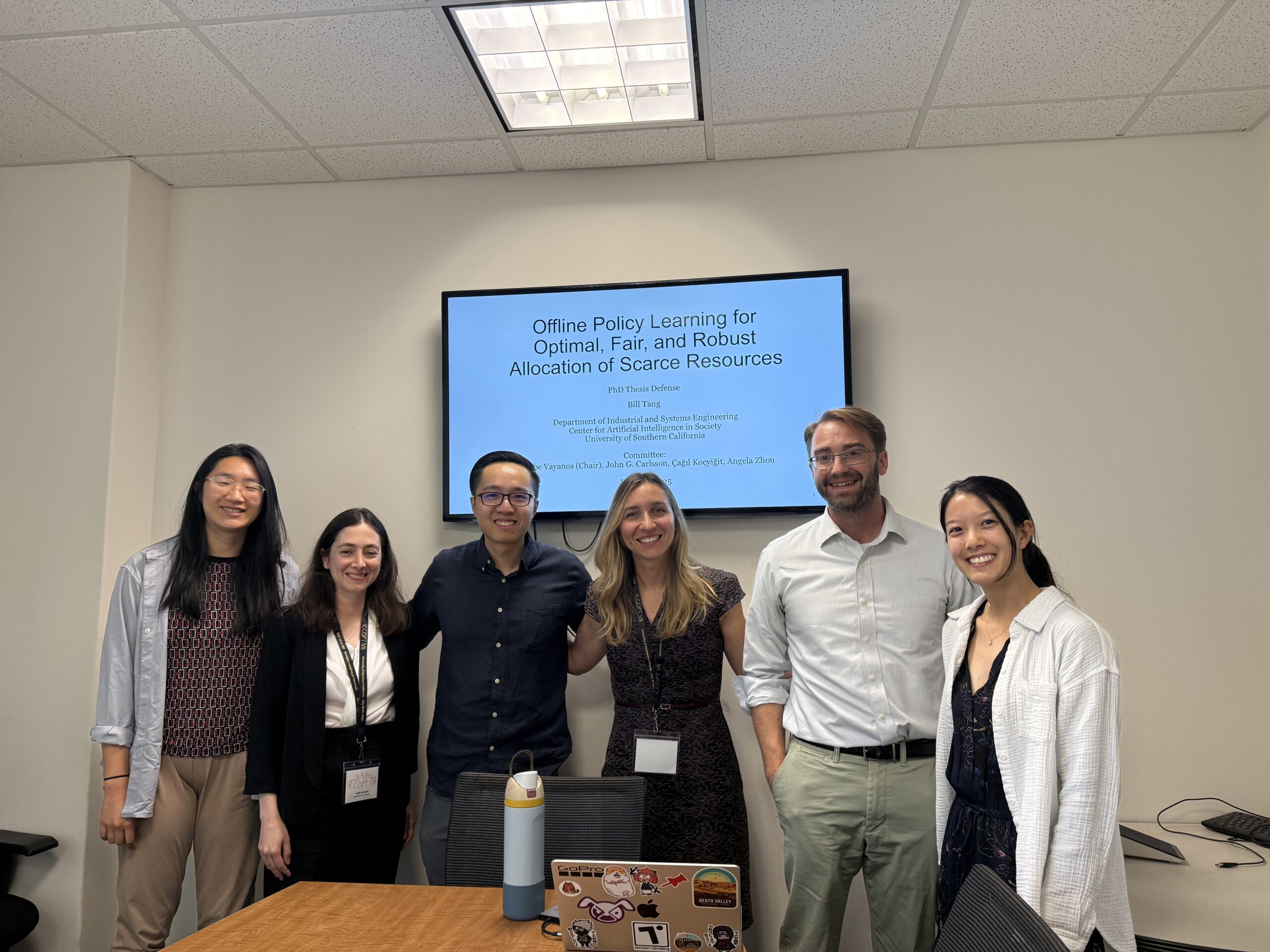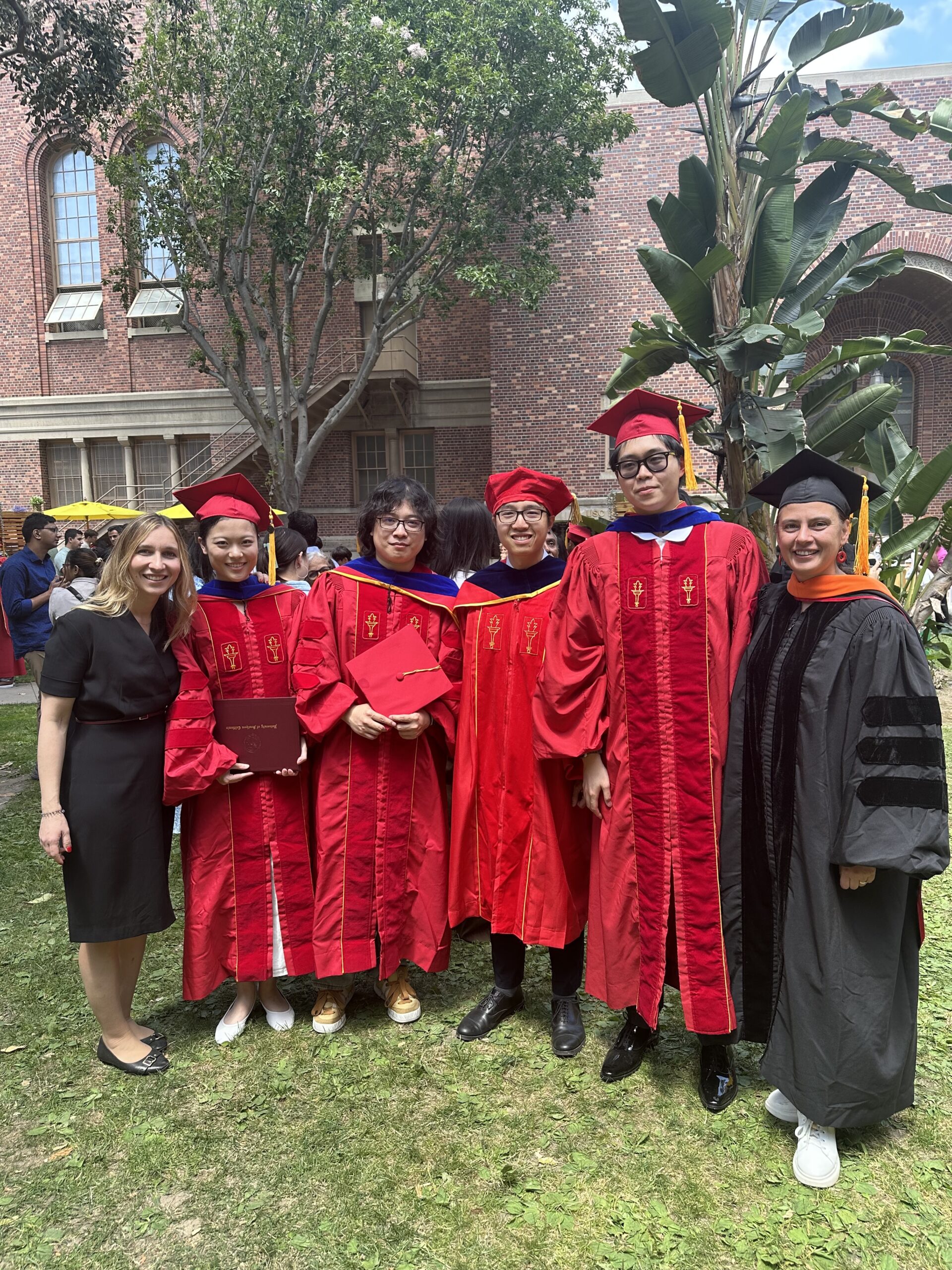
From L to R: Angela Zhou, Çağıl Koçyiğit, Bill Tang, Phebe Vayanos, John G. Carlsson, and Stephanie Ding after Bill’s successful PhD thesis defense.
Bill Tang graduated with his PhD in industrial and systems engineering in June 2025. Under the mentorship of CAIS Co-Director Phebe Vayanos, his research focused on using historical data to design homelessness services systems to allocate scarce resources in an efficient, fair, and robust way. As Bill prepares for his next chapter at Uber, he shares about his experiences at USC, including what led him to pursue his PhD and the unique opportunities he had.
Tell us a little about yourself.
My research interest lies at the intersection of constrained optimization, causal inference, and machine learning with applications in social good challenges. In particular, my research focuses on using historical data to design systems that allocate scarce resources in an efficient, fair, and robust way with application to homelessness services. In my freetime, I enjoy climbing, skiing, eating, and traveling.
What factors influenced your decision to pursue your Ph.D. at USC?
Before my Ph.D., I worked previously in finance analyzing the US housing market, where I learned about systemic problems like housing unaffordability, racial inequality, and credit availability from reading industry reports and academic papers. After a year at that job, I realized that I wanted to do technical research to solve these problems rather than write reports on financial securities related to the housing market. When I discovered my advisor Prof. Phebe Vayanos’s website, I was immediately drawn by her research to tackle social good problems, and in particular, homelessness. Given my interest in social good applications and my undergrad background in Operations Research, Phebe’s lab in the Industrial and Systems Engineering department felt like the place I needed to be.
What were some of your highlights at USC?
On a professional level, I’m very grateful for the chance to spend the last 5 years learning and doing research at the intersection of optimization, machine learning, causal inference, and social good applications. Coming from a finance background with relatively little technical and research experience, this opportunity allowed me to pursue my technical interests and learn what things I’m interested in working on. On a personal level, coming from New York, I appreciate being able to explore sunny Los Angeles and the friends I’ve made here.
Tell us about why you decided to get involved in CAIS.
Given my interests in technical research for social good applications like homelessness, joining CAIS was a no brainer. Through CAIS, I’ve gotten the chance to meet and collaborate with faculty and students across industrial engineering, computer science, and social work, and the opportunity to be exposed to policymakers working on homelessness in LA.

USC CAIS 2025 PhD graduates. From L to R: CAIS Co-Director Phebe Vayanos, Qing Jin, Yingxiao Ye, Bill Tang, Taoan Huang, and CAIS Co-Director Bistra Dilkina.
What specific projects or initiatives within CAIS have you been involved in, and how have they impacted your understanding of the intersection between social work and artificial intelligence?
The Coordinated Entry System Triage Tool Research & Refinement Project (CESTTRR), which was a multi-year interdisciplinary project to refine LA’s Coordinated Entry System, was a big project I was involved in. Through this, I was exposed to researchers across different disciplines and universities, social workers, and policymakers. My takeaway is that successful applications of artificial intelligence to social work domains is not necessarily about intense technical research or the fanciest algorithm. Instead, it’s equally if not more important to get the buy-in of various stakeholders and ensure the application problem is properly addressed.
How did the interdisciplinary environment at CAIS shape your approach to research and problem-solving?
Collaboration with researchers from different fields exposed me to different perspectives and taught me not everyone prioritizes the same things. This has forced me to think more critically and proactively about what each person cares about in a collaboration rather than just what my research community values.
If you could describe your Ph.D. experience at USC and CAIS in three words, what would they be and why?
Challenging, growing, eye-opening. My Ph.D. experience was challenging from doing and publishing technical research (something I did not have prior experience in), to the broader impact of Covid at the beginning of my Ph.D. I’m grateful for the growth I’ve experienced and the opportunities that my advisor Phebe gave me!
Tell us about your plans for the future.
After graduating, I’ll be joining Uber as a Machine Learning Engineer. As a person with a natural curiosity for learning technical knowledge, I’m excited by the opportunity to explore new areas of machine learning outside my Ph.D. experience and expand my toolkit.
Given your experience, what advice would you give to current and future Ph.D. students interested in exploring interdisciplinary research and collaboration, especially within fields like social work and AI?
Be mentally prepared for the interpersonal challenges of working across domains and with both technical and non-technical collaborators. To do meaningful interdisciplinary research requires soft skills and a conscious effort that engineering Ph.D. students may not have picked up from their technical disciplines. The only way to gain these experiences is to collaborate and talk with people outside your technical discipline and actively seek feedback to improve these soft skill areas.



